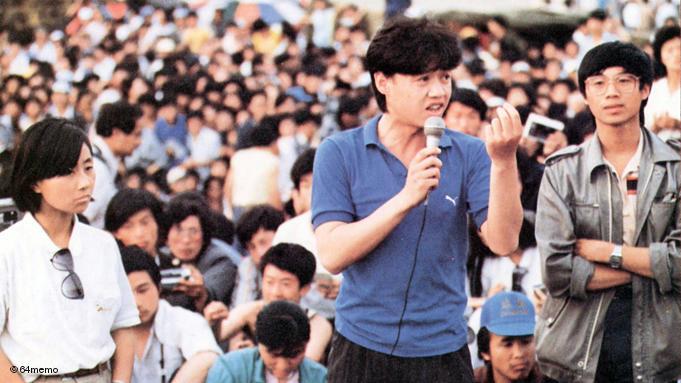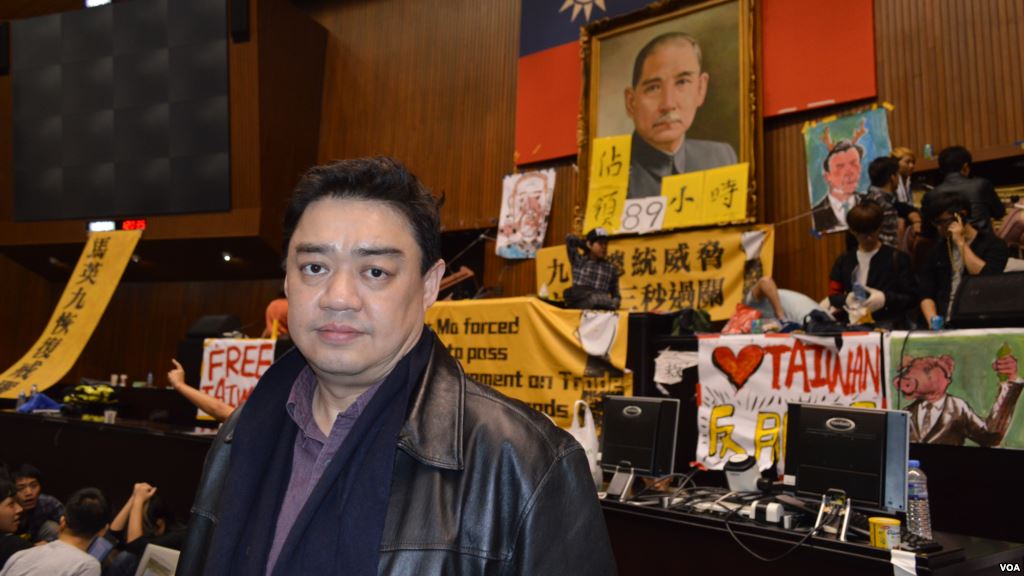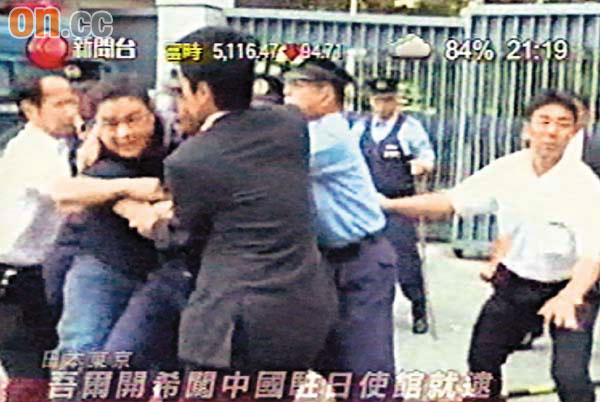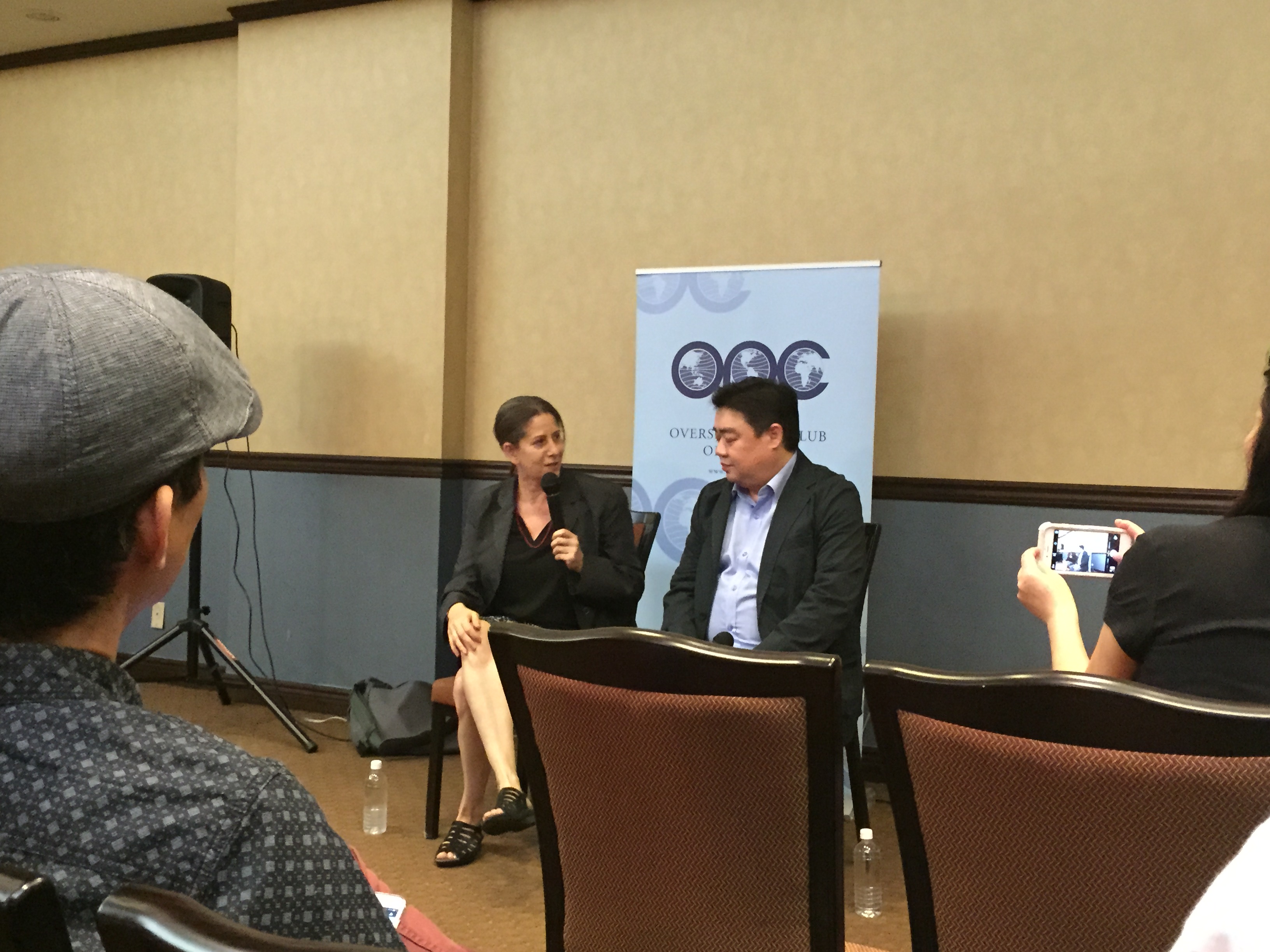by Brian Hioe
語言:
English
Photo credit: New Bloom
In early August in Taipei, New Bloom’s Brian Hioe interviewed Wuer Kaixi, longtime democracy activist and Chinese dissident known for his leadership in the 1989 Tiananmen Square protests. After studying in America, Wuer Kaixi later moved to Taiwan, where he became known as a political commentator. Wuer Kaixi recently announced that he would be running for legislator in Taichung as an independent.
Why Run for Legislator? And Why Run Now?
Brian Hioe: The first thing I wanted to ask is what motivated you to run for legislator in Taichung this year?
Wuer Kaixi: I’ve been a democracy activist since I was 21 and that altered the route of my life. I was in Beijing Normal University. If I did not take part in that major movement in China in 1989, most likely I would have ended up being a teacher or a school administrator. But the life I have been living now is because of my taking part in the 1989 student movement; weeks later, I became an exile and then a political dissident ever since. It’s been 26 years. Needless to say, politics or the concept of democracy, freedom, human rights, has been a core theme in my life.
I moved to Taiwan in 1996, for many different reasons. I visited Taiwan every year since 1989 until 1996. So at the time I moved in 1996, it was a very happy decision that I wanted to come to Taiwan to observe, to witness, to learn from the democratization of the society. Later on, I became a radio talk show host and a political commentator. From the role of being an observer or witness, it has deepened into the role of a participant. It’s a consistent path. To give you a long answer for a short question, why I decided to take part in the election, the question really should be why now? Why haven’t you done this in the past?
In the past 26 years of my life, I have always been a participant in democracy movements. Mainly in China, since where China is concerned I’m an exiled dissident. But it’s also being a political commentator here and I may proudly add, at one point a very celebrated one. And also a participant of quite a few social movements here. Having a voice is a very logical choice and being in a parliament will give you that platform. Being in the parliament will give you more power. You will be taking part in shifting government policy.
 Wuer Kaixi during the Tiananmen Square occupation in 1989. Photo credit: 64memo
Wuer Kaixi during the Tiananmen Square occupation in 1989. Photo credit: 64memo
Why now? There are a lot of pragmatic reasons. The electoral system was not very favorable for non-partisan members. Also, being a mainland Chinese immigrant to Taiwan, there is a law prohibiting me from running for public offices for the first ten years of my residency. But what really pushed me into making that decision is of course the Sunflower Movement, last year’s nine-in-one election, and the victory of Ko Wen-Je. I also think the Hong Kong situation has clearly pointed out that the upcoming challenge for Taiwan, which is very pressing, is cross-strait relations.
I like Taiwan a lot but I have a deep concern for the people here. The biggest problem of Taiwan is people, in fact, that they are naive. They are a little too pragmatic, it’s a merchant society, and then also sometimes near-sighted. Somehow we have given up on the good habit of having intellectual debates.
The first time I was here in 1990. I really loved Taiwan at that time. It was a golden age. At that time, when the United Daily News and China Times were the two major newspapers, each consisted of 60 pages every day. Very thick. Lots of articles. Not a lot of photos. And a lot of people generally read through them. That was the time when people were taking their pace slower. But I think the Internet and then tabloid media, all these things have contributed that not only in Taiwan, but globally, people are getting shallower. Taiwan is not exempt from that virus.
I wanted to shout at Taiwan to wake up. Because I see mainland China—I was born and raised in mainland China, of course—and I happen to know the Communist Party a little. The basic idea of Taiwan towards communist China is that if we can stay away from them, we can be better off. I hate to point it out, but it’s almost a cowardly response to what has happened in the past years to the present. Instead of shouting and waking Taiwanese people up, I see an opportunity to jump into the battle and be in the front lines.
I think I owe it to Taiwan. This is my adopted country, I chose to move here, from the United States, in fact. I had a fairly good life in the US! I was twenty-something years old and I had a Green Card and a good job from a prestigious firm. And it’s the US, everyone at that time in 1996 was to the US from Taiwan, I guess. But I came to Taiwan because I love Taiwan. I have made a lot of criticisms of Taiwan, but let me add, I have a lot of admiration for Taiwan. The 23 million Taiwanese people are very kind. They are so kind, they are willing to help each other, they are willing to help any foreigner, and they are very accepting. They are good learners and hard workers. They have been making differences.
But I want to point out the obvious problems of Taiwan. Maybe it would be sufficient being a public intellectual, a political commentator, just to do those, but I think when the challenge rises to a new level, it’s no longer sufficient. You just need to jump in. This is a good time to do so. All the outside conditions seem to be a little bit more favorable than before.
Political Aims
BH: What would you try to accomplish by jumping in now?
WK: Well, I’ve talked a bit about my cross-strait relation policy platform and that’s one example. I want to run this campaign by running a series of articles. Something like twenty articles, or something along those lines. Many of them will eventually require passing laws and then having a political debate to form national policy. Cross-strait relations being one example. The other one is the internal stand-off between blue and green. One of the early articles, the first article, I have introduced in this election made that point.
My major concern and one of the major points I have in criticizing Taiwanese society in the past decade, maybe longer. I see in the upcoming election, the presidential election, the KMT is going to lose. There is no suspense there! But I worry this power shift will increase the pluralization of Taiwan. Well, every election does. The KMT, although they have many reasons to take a bow and step down for awhile, the reason it hasn’t for so many years also is because people do not entirely trust the DPP.
 Wuer Kaixi inside the Legislative Yuan during the Sunflower Movement in 2014. Photo credit: VOA
Wuer Kaixi inside the Legislative Yuan during the Sunflower Movement in 2014. Photo credit: VOA
The DPP has not gained the trust of Taiwan—certainly not from me—but there is going to be a DPP president and a DPP parliament, most likely. Are we replacing one monstrous political authoritarian party with another? That’s my concern. One of the biggest issues I forecast in the next year and the following year is the KMT party asset issue. There will be a lot of people with newly gained power who would be very interested in getting their hands on that. If that happens, that will be another setback for democracy.
In the year 2000, we gave a chance to the DPP and they abused it. In 2008, we punished them by even letting the KMT come back. The KMT wasted its chance again, so by definition we’re punishing them, but we’re giving the DPP the second chance they don’t deserve. They haven’t earned it.
Therefore, the Third Force is extremely important at the time of the falling of the KMT. The KMT can totally fall. But pan-blue shouldn’t. There are the people who usually support for the KMT—for good reasons—they should have an alternative voice remaining in the political spectrum. I’m not sure I will represent all of their voices, because many of them I do not agree with, but I would like to make sure they are concerned with one thing, which is do not nurture another political monster. That requires law, that requires political negotiating.
One of my agenda is to call for the law to block the DPP if they attempt to pass a favorable law to exploit their power, or try to manipulate the situation with their power. In fact, I want to do it in a positive way, I want to introduce a law with which we can turn the KMT assets into something good for society, avoiding political corruption through a series of steps, in some sense restoring KMT supporters’ pride. All these are not easy to do. And the DPP would not be interested in doing that.
So that is one of my most important agenda points for the four years. Although, a parliamentary member has a term of four years, I think if you have a good agenda, one will be enough. But I’ll have more than one.
I also believe the political pluralization between blue and green should be eased. The best way to achieve that is always through dialogue. This is one thing I have believed in throughout my life, beginning from the 1989 student movement across the last twenty something years including the time I tried to turn myself over to the Chinese authorities.
BH: So you’re running as an independent?
WK: Yes, I will be member of the Progressive Alliance (進步連線). But Progressive Alliance is has not yet decided and probably is not going to form a political party.
Taiwan’s Influence on China
BH: I wanted to ask then if you see influence from Taiwan on China. For example, I talked to Chen Guangsheng and he said something similar regards to Taiwan and Hong Kong. I interviewed him around the time of the Umbrella Movement. I’m curious about what you would have to say.
WK: Taiwan’s influence upon China? Well, Taiwan’s influence to China has been great in the last few years, in the last five or six years since President Ma opened the link of direct travel from Taiwan to China. Millions of Chinese people have come here and seen it and when they go back their voices were heard. Their opinion was out there.
So I think whatever they say, before and after, no matter which person, what kind of education background, or political agenda they had, the feeling I am quite sure is different after visiting Taiwan. And I have read tons of materials that project that idea. Nothing to the contrary. Nobody has written anything on the Internet or anywhere I have seen, saying that before we went to Taiwan, we didn’t think too much of it, and after that we still don’t. I never have read anything like that. Even those people who did look down on Taiwan, after they had come, they were in awe and very impressed. The influence will be huge. As for the part of Taiwan they are talking about, well, it depends on the person. The one thing I think they said the most is about the kindness of Taiwanese.
 Wuer Kaixi attempting to charge into the Chinese embassy in Tokyo in October 2010. Photo credit: Oriental Daily
Wuer Kaixi attempting to charge into the Chinese embassy in Tokyo in October 2010. Photo credit: Oriental Daily
I’m not sure if you have noticed, I want to point out that in today’s world, there are tourists from two countries which are the least welcome. One is from China, the other is from Russia. We are too concerned about political correctness and don’t dare openly talk about this phenomenon, but why shouldn’t we? I certainly want to, being a former PRC citizen. I realize the reason, for instance, people from those countries don’t want to stand in line because it is an image of being obedient.
In China, in the Soviet Union, in former Communist countries, it’s basically being obedient. Being submissive to the institution and the rules they have set up. Those rules, more often than not, never really serve the interest of people. It’s an oppressive society that asks you to do things. If you do, usually nothing good comes to you. If you don’t, it would be even worse. People are caught into that kind of mentality and they lose their kindness.
When travelers come to Taiwan and go back and say Taiwanese are kind, some people, some intellectuals elaborated that, why is that? Because being civil, it serves the interest of people. And Taiwan’s political system—they do not shy from mentioning this—Taiwan’s political system is a democratic system that respects freedom and that usually lets people serve their own interests.
What’s the point of being civil in a Communist country? That’s one of the most unfortunate fact of countries like China or Russia. I went to a few other former Communist countries, too, it’s also a similar situation, that Communist rule did not just suppress people and remove them from their freedom, they have taken away their basic humanity. That humanity is something original from humans, which is why we call it humanity, but then when it is so long neglected or oppressed, you don’t see that in yourself. You go to a society and see that there is a strong sense of familiarity, especially with a common language environment.
So Taiwan’s influence on China is huge. It has already become a beacon that Chinese people look up to. The more they know, the more they will look up to Taiwan. Especially in a society like China, where free information flow is not allowed. When they say something, sometimes it’s just to mimic a feeling, they want to be part of a debate, they want to be part of something good. But that sensation comes out from their mouths as “We want unification! We don’t want Taiwanese independence!” I often get into debates like that. But nevertheless, I can assure you this, I want you to report this to your readers, that I know today, even those people who say the meanest things, they’re raised in this kind of culture, but people from mainland China look up to Taiwan. That’s the influence there.
Last Words
BH: Okay. So the last thing I wanted to ask then, was what would you say to not only Taiwanese but international readers?
WK: A lot of things. First of all, that Taiwan deserves a lot more space and voice in the international arena, but the people who read your magazine probably already agree with that one.
BH: Sometimes.
WK: Most of times, I believe. I’m convinced of that actually. But to your readers: There’s a problem with the international community here in Taiwan. When they look at Taiwan issues, they tend to simplify it. For instance, the DPP has much larger supporters among expats than the KMT. The KMT virtually has none. Overwhelming support, what does that really say? That forty to sixty percent of Taiwanese people who are pan-blue are just not getting it? Or is it the other way around?
The international community tends to pick—excuse me for using this term—“sexy” topics to discuss: For example, Taiwanese independence. In fact, I have been restlessly saying this in all my lectures both in English or Chinese about the terminology of Taiwanese independence. Almost everyone has a different interpretation of that. The international community is not getting that.
 Wuer Kaixi speaking at an event at the Overseas Press Club of America in New York in late September. Photo credit: Brian Hioe
Wuer Kaixi speaking at an event at the Overseas Press Club of America in New York in late September. Photo credit: Brian Hioe
But Taiwanese people are to share the blame for that phenomenon. For example, Taiwanese people use the term unification or independence ruling party, this term has been around for twenty to thirty years. That’s ridiculous because there is no pro-unification forces in Taiwan. There are pro-independence forces. There are people who are not agreeing so much with pro-independence and there also people who don’t like the term independence. But they are all actually pro-Taiwanese independence.
What does it mean, Taiwanese independence? Taiwan is independent. When you ask a foreigner, what does it mean, I’m “pro-Taiwanese independence”? If a Tibetan says, I’m pro-Tibetan independence, that’s clear, because Tibet is part of China and there is a movement to separate it from being a part of China. Tibet independence means political separation. In the national structure, I mean. Or you can say culturally we are different, so we are restoring that—there are clear definitions for that.
Please tell me what does Taiwanese independence mean? Separate from whom? I tell you this, for the longest time, the Taiwanese independence was about separating from the Republic of China. I think most foreigners don’t get it. What does it mean? Taiwanese independence as separating from the Republic of China? Isn’t Taiwan the Republic of China?
But for a long, long time, the DPP’s Taiwan independence was never targeted at separating from the People’s Republic of China. They never care about the People’s Republic of China. The only enemy in this campaign, for the Taiwanese independence campaign, is the KMT. I think expats, the international community, don’t quite get that. They are supporting independence for the sake of it. Independence from China? “China is bad and evil— excuse me—Communist—yeah, we want to separate from them.”
But today’s Taiwanese independence movement is also very different from the early Taiwanese independence movement. The young people, when they say Taiwanese independence, the enemy image rising from that statement is Beijing. So the Taiwanese independence movement is very different Chen Wei-Ting’s Taiwanese independence is very different from Tsay Ting-Kuei’s.
And I hope the international community can at least get that. As ironic as it is, I think it will take a longer time for Chen Wei-Ting and Tsay Ting-Kuei to get it. But having a dialogue. It’s is always the best thing. It’s sometimes neglected and oppressed, but if we keep doing that, we’ll be much better off.





